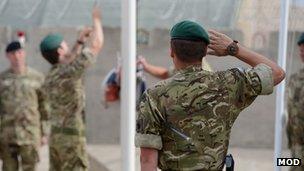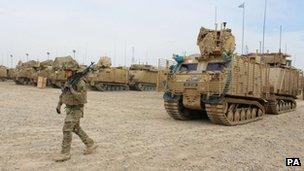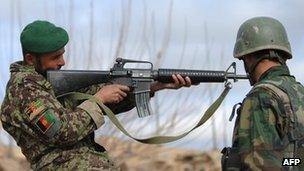Afghanistan: Challenges of security handover
- Published

The last group of Royal Marines to serve in Afghanistan, 40 Commando, left last week
As the war in Afghanistan fades from the front pages in the West as fewer international troops die, the human cost of the conflict is increasingly being borne by Afghan forces.
On Friday, the Taliban attacked and killed at least 13 Afghan soldiers in the Naray district of Kunar, an area near the border with Pakistan long contested and used by insurgents and foreign fighters as a transit route.
The insurgents attacked just before dawn.
It was yet another test of Afghan national security forces as Nato steps back from its front-line role, ahead of the withdrawal of coalition combat troops by the end of 2014.
The soldiers killed were in what was deemed to be one of the most effective Afghan fighting units.
'Operational intensity'
The death rate for Afghan forces has risen over the past year or so while the number of deaths among coalition troops - such as the UK's - has fallen.
In the 12 months up to March 2013, 1,170 Afghan soldiers were killed and another 3,000 wounded out of an army of 146,000, according to the Afghan ministry of defence in Kabul.

The number of UK troops in Afghanistan will be reduced from 9,000 to 5,200 by the end of 2013
The Afghan police suffered 1,800 deaths in 2012.
The Afghans put the rate down to a greater number of Afghan troops overall, and the fact that they are now conducting operations on their own with the summer fighting season fast approaching.
For the UK, fatalities peaked in 2009 with 108 British deaths, according to the independent iCasualties website. Most of those were in Helmand.
In 2010, at a time when British forces were still very much in the lead in operations against the insurgency, that figure was 103.
In 2011, as the UK and the rest of the coalition started handing over the security lead to Afghan forces, 46 British troops died. And in 2012, as the handover progressed, there were 44 British deaths.
There has been a similar fall in the number of coalition deaths since 2010, when 711 coalition troops died - compared with 566, in 2011, and 402, in 2012.
And so far this year, three members of the UK military have been killed in Afghanistan, compared with 16 from January-April 2012.
Over the next few months, Afghan forces are expected to take over security across the country, though coalition commanders insist their troops remain on hand as a combat force should they be needed.
The deputy commander of the Nato-led International Security Assistance Force (Isaf), Lt Gen Nick Carter, said he was worried about "the rate of attrition that the Afghan forces are having to cope with presently".
"And that is why it is important that we work closely with them so that they manage this upcoming period of high operational intensity," he told BBC News in Kabul.
"What we can't afford the Afghans to do during the course of this summer is to fail.
"We regard Afghan confidence as our centre of gravity. To that end, if the Afghans need our help we are there."
He said the Afghans taking the lead on security "inevitably means that they are more likely to take casualties than we are".
But he insisted: "They are demonstrably still willing to fight and the Afghan security forces are better and better prepared for what lies ahead.
"But of course the summer is a challenging time."
Suicide bombs
The Afghan National Army, which has to replace and train nearly a third of its force every year because of desertion and attrition, is facing an insurgency that has not given up the fight.
The Taliban seem to be focusing more, so far this year, on directly taking on Afghan forces than it did in previous years, when its main tactics included roadside bombs and suicide bombs.
Suicide bombs followed by the use of firepower by insurgents at close range appear to be on the rise - as on 3 April when the Taliban carried out a complex attack in Farah, in western Afghanistan.
It began with a suicide bomb ahead of hostage-taking in a court-house.

The Nato-led coalition says Afghan forces have "developed phenomenally"
That was followed by an all-day gun battle with Afghan national security forces which left more than 40 people dead and injured more than 90 in total.
But the Nato-led coalition says Afghan forces are more than capable of taking on the fight as the west starts to withdraw.
Task Force Helmand outgoing commander, Brigadier Bob Bruce, said Afghan forces in the province have "developed phenomenally, not just in capability but also in confidence".
His successor, Brig Rupert Jones, added: "In areas such as medical support and casualty evacuation, what we need to do over the summer is provide that assistance to Afghan forces, but concurrently develop their abilities."
The coalition withdrawal from Helmand is gathering pace - of the 37 bases that British forces occupied last year, only 12 remain.
But while Afghan forces are bearing the brunt of the fighting and the dying, a huge number of Afghan civilians - 2,754 - were killed in the conflict.
That makes civilians the greatest casualties of the war, with four out five of those deaths caused by the Taliban.
- Published12 April 2013
- Published10 April 2013
- Published9 April 2013
- Published6 April 2013
- Published1 April 2013
- Published28 January 2013